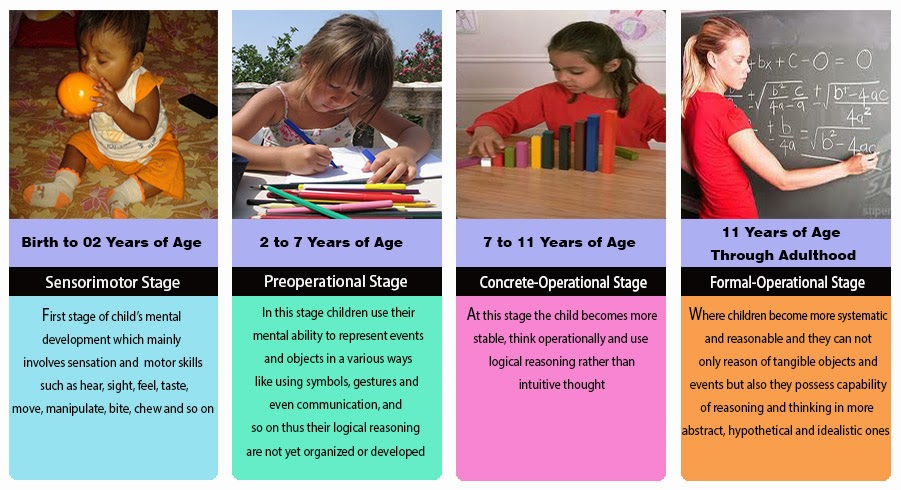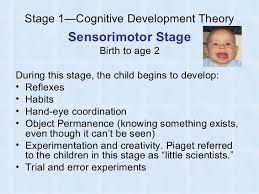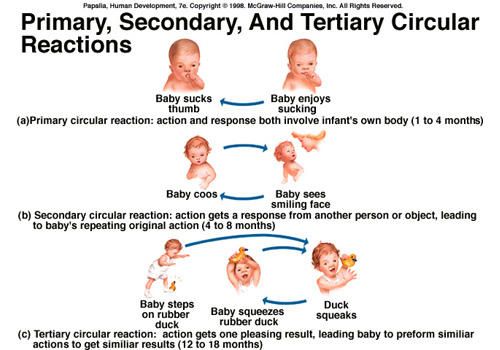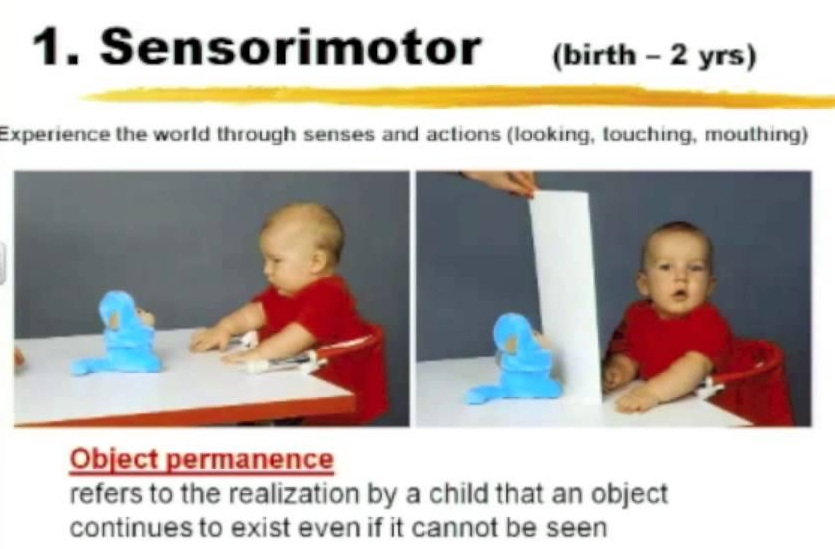Stages of Intellectual Development
Dr.Balan Stephen
Introduction
Biology and experience blend to produce learned behaviour.
Jean Piaget described four major stages leading to the capacity for adult thought.
Each stage is a prerequisite for the following one
But the rate at which different children move through different stages varies with their native endowment and environmental circumstances.
Four Stages
The four stages are;
1. sensorimotor stage ( birth to 2 years)
2. stage of preoperational thought ( 2 to 7 years)
3. stage of concrete operations (7 to 11 years)
4. Stage of formal operations (11 years through the end of adolescence).
Sensory Motor Stage (Birth to 2 Years)
Infants learn through sensory observations
They gain control of their motor functions through activity, exploration and manipulation of the environment.
The child achieves the development of object permanence or the schema of permanent object.
It is the ability to understand that objects have an existence independent of the child's involvement with them. Infants learn to differentiate themselves from the world
Develop a mental image of an object, even when it is not present and visible.
When an object is dropped in front of infants, they look down to the ground to search for the object. That is they realize the object has a reality outside them.
At 18 months, infants develop mental symbols and use words - symbolization.
Infants create a visual image of the word ball and knows that the word stands for the real object.
Piaget divided this stage into six sub stages.
Birth to 2 months:
Uses inborn motor and sensory reflexes such as sucking, grasping, looking to interact and accommodate to the external world.
2 to 5 months:
Primary circular reaction - coordinates activities of own body and five senses (e.g. Sucking thumb).
Reality remains subjective. Does not seek stimuli outside of its visual field.
Displays curiosity.
5 to 9 months:
Secondary circular reaction - seeks out new stimuli in the environment.
Starts both to anticipate consequences of own behaviour and to act purposefully to change the environment,
This is the beginning of intentional behaviour.
9 months to 1 year:
Use of familiar means to obtain ends.
Shows preliminary signs of object permanence.
Has a vague concept that objects exists apart from itself.
Imitates novel behaviour.
1 year to 18 months:
Tertiary circular reaction
Seeks out new experience.
Produces novel behaviours.
18 months to 2 years:
Symbolic thought: sees symbolic representations of events and objects.
Shows signs of reasoning. e.g. uses one toy to reach for and to get another.
Attains insight and object permanence.
Stage of Preoperational Thought (2 to 7 years)
Children use symbols and language more extensively than in the sensorimotor stage.
Thinking and reasoning are intuitive.
Children learn without the use of reasoning.
They are unable to think logically or deductively, and their concepts are primitive.
They can name objects, but not classes of objects.
Events are not linked by logic.
Children in this developmental stage are egocentric. They see themselves as the centre of universe. They have limited point of view. They are unable to take the role or understand the role of others.
Deferred imitation, symbolic play, graphic imagery (drawing), mental imagery, and language development.
Stage of Concrete Operations (7 to 11 years)
Children act on the concrete, real, and perceivable world of objects and events.
Egocentric thought is replaced by operational thought, which deals with an array of information outside the child. Therefore, children can see things from someone else's perspective.
Syllogistic reasoning, in which a logical conclusion is formed from two premises, appears during this stage.
For example,
all horses are mammals (premise);
all mammals are warm blooded (premise);
∴ all horses are warm blooded. (Conclusion).
Conservation of quantity, weight, volume, length, and time - based on reversibility by inversion or reciprocity; operations; class inclusion and seriation.
Stage of Formal Operation (11 years through the end of adolescence)
The stage is characterized by the ability to think abstractly, to reason deductively, and to define concepts and also by the emergence of skills for dealing with permutation and combination.
Can grasp the concept of probabilities.
Hypotheticodeductive Thinking
The highest organization of cognition enables persons to make a hypothesis or propositions and to test it against reality.
Deductive reasoning moves from the general to the particular and is a more complicated process than inductive reasoning which moves from the particular to the general.
* * * * * * * * * *






